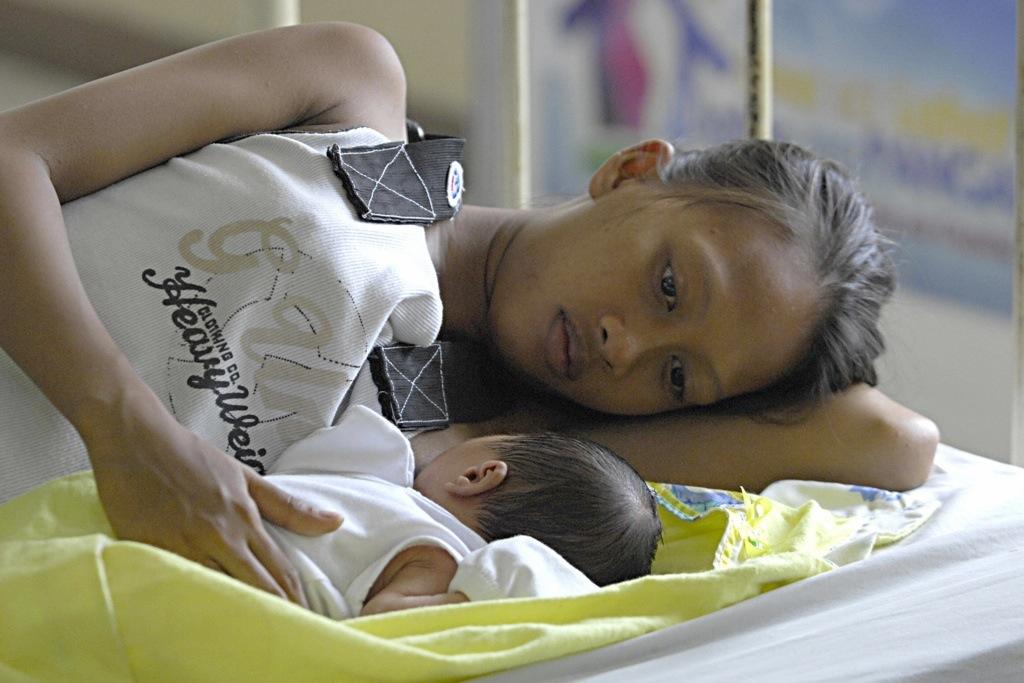Best way to improve infants’ health? Breastfeeding
A mother breastfeeds her new born baby inside a maternity clinic in Manila.
Editors’ note: The author is president and CEO, Save the Children, whose mission is to inspire breakthroughs in the way the world treats children and to achieve immediate and lasting change in their lives.
WESTPORT, Connecticut — There is something inherently joyous in a mother being able to breastfeed her child.
And although it is one of nature’s natural marvels, it is not always easy. As a mother myself, I have had the opportunity to both breastfeed and formula feed my children. I realize how lucky I am that I had that choice. However, many mothers in other parts of the world struggle every day to keep their babies nourished and healthy. As a result, more than 2.6 million children die from malnutrition each year, and at least 170 million children suffer lifelong physical and mental effects from chronic malnutrition that robs them of the chance to reach their full potential.
According to Save the Children’s 13th annual State of the World’s Mothers report, less than 40 percent of all infants in developing countries receive the benefits of breastfeeding, putting them at greater risk of death and disease. For example, infant formula prepared with unclean water can lead to diarrhea, the second leading cause of child deaths.
Take the story of Hira, a mother in Nepal with a demanding schedule who looks after her three small boys while her husband is away for months at a time working outside the country. Hira started breastfeeding all three of her children but had difficulty finding the time or energy to continue with the first two. In addition to child-rearing duties, she was in charge of the family farm, waking up early and laboring in the fields. She was unable to breastfeed as regularly, and after about three months of trying, her milk production was diminishing. Instead, she began to feed the boys leeto, a porridge made of wheat and soy. Both boys suffered frequent illnesses such as common colds, coughs, fever, pneumonia and diarrhea.
When Hira became pregnant with her third child, a female community health volunteer in her village, trained by Save the Children, counseled Hira on the importance of breastfeeding exclusively for the first six months of a child’s life. Leeto and other solid foods, she learned, were not to be introduced until after six months and, even then, she should continue breastfeeding to help ensure the ongoing healthy growth and development of her child.
More from GlobalPost: Best and worst places to be a mother
As a result of her training, Hira fed her third son, Sandesh, only breast milk for his first six months. She was amazed to see Sandesh flourish and remain healthy and strong. He has only been sick once since he was born.
Throughout time and across economic, geographic, and cultural strata, breastfeeding remains one of the most effective ways to save lives and ensure a healthy start in life in developing countries. If mothers in developing countries, where infant nutrition options are scarce, adopted breastfeeding in greater numbers, the deaths of almost 1 million children could be prevented each year.
Research shows that the first 1,000 days — from pregnancy to after a child’s 2nd birthday — is the critical window for ensuring their healthy growth and development.
More from GlobalPost: Thousands flee to a new refugee camp in South Sudan
Children who receive proper nutrition throughout this time are better able to fight off disease, perform well in school and ultimately earn higher wages. That is why it is so important for trained health workers to encourage and support breastfeeding within a half-hour of birth and ensure mothers have on-going breastfeeding support for as long as they need it.
Many of us can play a role in helping children in developing countries get a healthy start in life. Communicate with your government officials. Sign Save the Children petition, make phone calls and send emails. Explain how important it is to invest in nutrition for mothers and their children, especially the first 1,000 days. Post it on your Facebook accounts and encourage your friends to do so as well.
This Mother’s Day, let’s show the world we care about mothers everywhere. What better gift is there than the gift of friendship, of understanding different situations, of helping each other in the most natural of ways? Together, we can save lives.
More from GlobalPost: Meet the people behind Turkey's 'miracle'
We want to hear your feedback so we can keep improving our website, theworld.org. Please fill out this quick survey and let us know your thoughts (your answers will be anonymous). Thanks for your time!
